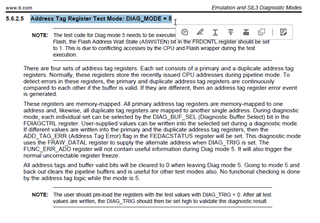Part Number: RM44L920
Tool/software:
Hi,
I'm working on implementing 2-bit ECC tests for Flash and SRAM using the Safety Diagnostic Library (SDL) and following the SDL demo example.
However, I'm encountering failures with these tests, and I'm having trouble identifying the cause.
retVal = SL_SelfTest_SRAM(SRAM_ECC_ERROR_FORCING_2BIT, TRUE, &failInfoTCMRAM); INCREMENT_PASS_FAIL_COUNTER(failInfoTCMRAM, retVal); // failInfoTCMRAM = ST_FAIL /* Run 2Bit ECC test on Flash */ retVal = SL_SelfTest_Flash(FLASH_ECC_TEST_MODE_2BIT, TRUE, &failInfoFlash); INCREMENT_PASS_FAIL_COUNTER(failInfoFlash, retVal); // failInfoFlash = ST_FAIL
Additionally, I've noticed that in the SDL demo example, a certain test is commented out in the sys_startup.c file. Could someone explain why this test is commented?
Is there a specific reason or condition for it to be disabled by default?
#if 0 /* Run Address tag mode test on Flash */ retVal = SL_SelfTest_Flash(FLASH_ECC_ADDR_TAG_REG_MODE, TRUE, &failInfoFlash); INCREMENT_PASS_FAIL_COUNTER(failInfoFlash, retVal); #endif
Thanks & regards,
Ilija


